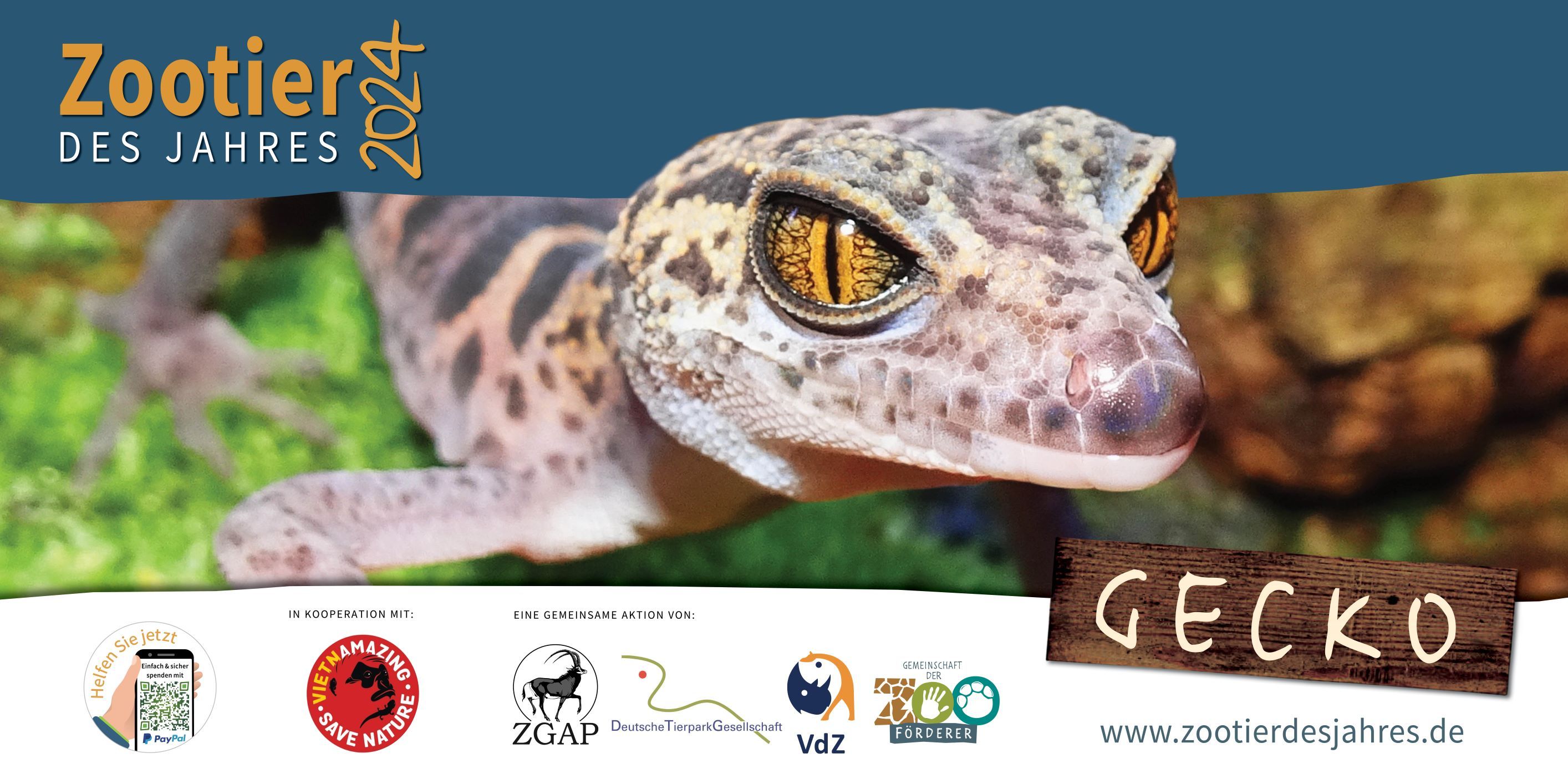-
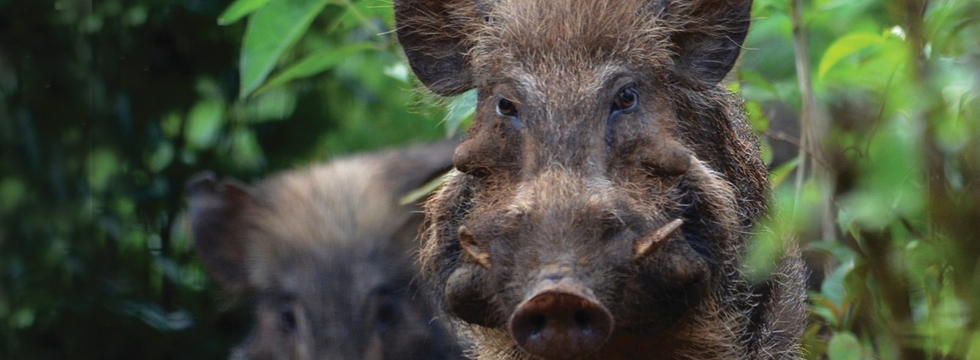 Java Warty pig
Java Warty pig Sus verrucosus
Sus verrucosus The Javan warty pig is threatened by habitat loss, high hunting pressure, hybridisation and the deadly "African swine fever” disease.
The Javan warty pig is threatened by habitat loss, high hunting pressure, hybridisation and the deadly "African swine fever” disease.Therefore, Javan warty pigs are bred at the Prigen Conservation Breeding Ark (PCBA). Their population is developing well, but due to heavy poaching, reintroduction is not yet possible.
-
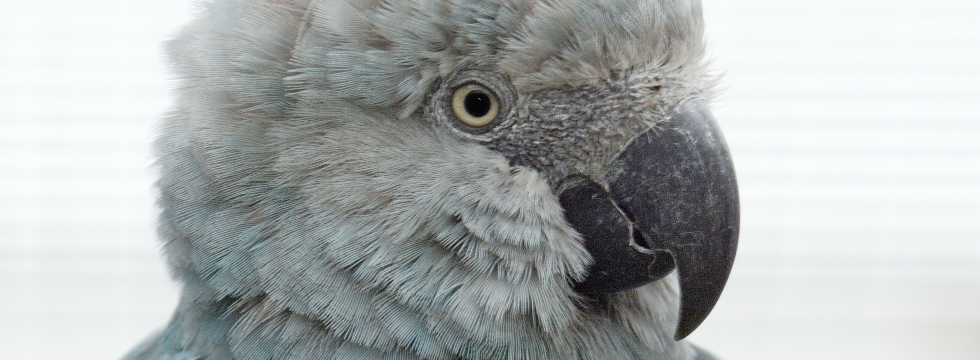 SPIX's MACAW
SPIX's MACAW Cyanopsitta spixii
Cyanopsitta spixii Since the turn of the millennium, the Spix’s Macaw is considerd to be extinct in the wild. In 1987, ZGAP was one of the first conservation organisations pointing out to the alarming situation of the remaining wild population of this impressive, blue shimmering parrot
Since the turn of the millennium, the Spix’s Macaw is considerd to be extinct in the wild. In 1987, ZGAP was one of the first conservation organisations pointing out to the alarming situation of the remaining wild population of this impressive, blue shimmering parrot However, the Spix’s Macaw survived under human care. ZGAP is supporting extensive preparations for a reintroduction of this “flagship species” in Brazil. Field studies on the Blue-winged Macaw, a sister species occurring in the same area, will contribute to the best possible outcome of these conservation efforts.
However, the Spix’s Macaw survived under human care. ZGAP is supporting extensive preparations for a reintroduction of this “flagship species” in Brazil. Field studies on the Blue-winged Macaw, a sister species occurring in the same area, will contribute to the best possible outcome of these conservation efforts. -
 PERSIAN LEOPARD
PERSIAN LEOPARD Panthera pardus ssp. saxicolor
Panthera pardus ssp. saxicolor With 870 to 1300 remaining individuals, the impressive cat is considered to be endangered. The greatest threats are the decrease of suitable prey, alterations of its habitat by human activities, and poaching.
With 870 to 1300 remaining individuals, the impressive cat is considered to be endangered. The greatest threats are the decrease of suitable prey, alterations of its habitat by human activities, and poaching. In 2016, ZGAP supported a research project to analyze its distribution, health status and the amount and origin of its prey in Iran. Extensive educational work raised the people's awareness for its endangerment in the area.
In 2016, ZGAP supported a research project to analyze its distribution, health status and the amount and origin of its prey in Iran. Extensive educational work raised the people's awareness for its endangerment in the area. -
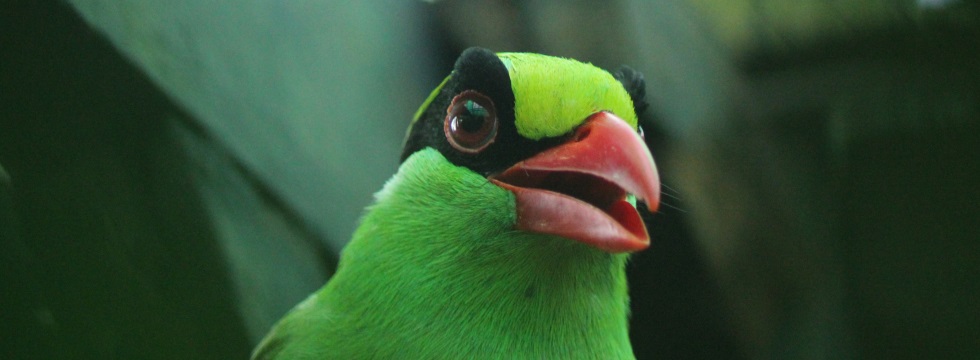 JAVAN GREEN MAGPIE
JAVAN GREEN MAGPIE Cissa thalassina
Cissa thalassina The Javan Green Magpie is one of the most beautiful songbirds in Southeast Asia. Due to its vibrant feathers it is highly sought-after as a cage bird in Indonesia. This has put the population (currently only around 250 mature individuals) under massive hunting pressure.
The Javan Green Magpie is one of the most beautiful songbirds in Southeast Asia. Due to its vibrant feathers it is highly sought-after as a cage bird in Indonesia. This has put the population (currently only around 250 mature individuals) under massive hunting pressure. ZGAP is supporting breeding programs for several endemic, critically endangered bird species - among them the Javan Green Magpie – at Cikananga Conservation Breeding Centre and Taman Safari on the Indonesian island of Java.
ZGAP is supporting breeding programs for several endemic, critically endangered bird species - among them the Javan Green Magpie – at Cikananga Conservation Breeding Centre and Taman Safari on the Indonesian island of Java. -
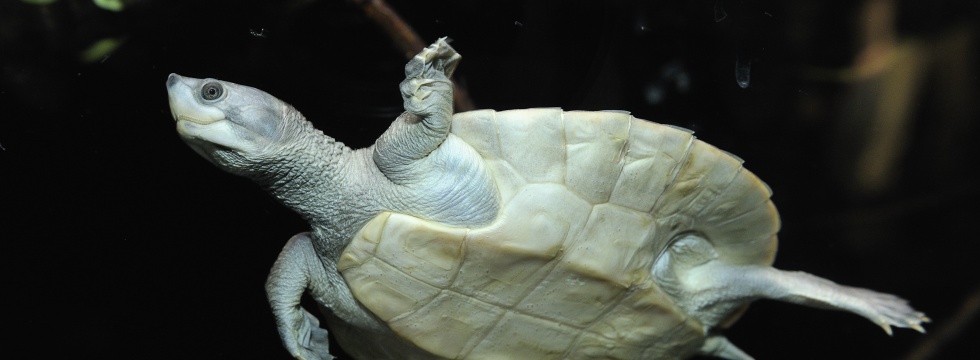 NORTHERN RIVER TERRAPIN
NORTHERN RIVER TERRAPIN Batagur baska
Batagur baska Among Bengalese Hindus, the Northern River Terrapin is regarded as the most delicious turtle species of all - with devastating consequences: it has been hunted for its flesh, its eggs have been collected and eaten and its shell has been processed to medicine.
Among Bengalese Hindus, the Northern River Terrapin is regarded as the most delicious turtle species of all - with devastating consequences: it has been hunted for its flesh, its eggs have been collected and eaten and its shell has been processed to medicine. Together with the destruction and pollution of its nesting sites, this has probably led to its extinction in the wild. For many years, ZGAP has been supporting a research and breeding centre of the Turtle Survival Alliance (TSA) and Zoological Garden Schönbrunn, Vienna.
Together with the destruction and pollution of its nesting sites, this has probably led to its extinction in the wild. For many years, ZGAP has been supporting a research and breeding centre of the Turtle Survival Alliance (TSA) and Zoological Garden Schönbrunn, Vienna. -
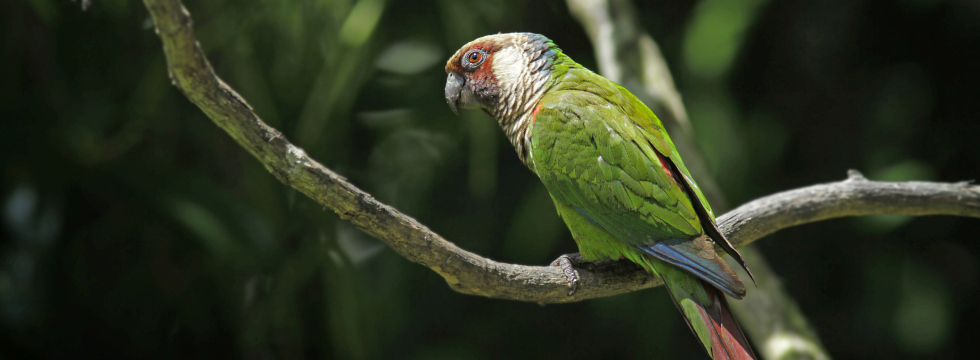 GREY-CRESTED PARAKEET
GREY-CRESTED PARAKEET Pyrrhura griseipectus
Pyrrhura griseipectus The increasing worldwide demand for coffee makes life hard for this rare parrot, as its habitat is destroyed for the establishment of coffee plantations. Furthermore, illegal poaching for the pet market contributes to the dramatic decline of the population.
The increasing worldwide demand for coffee makes life hard for this rare parrot, as its habitat is destroyed for the establishment of coffee plantations. Furthermore, illegal poaching for the pet market contributes to the dramatic decline of the population. It is therefore classified as "critically endangered". However, thanks to a research and protection program in the Baturité mountains which has been supported by ZGAP since 2007, there is hope for the birds: the population size in the area has trippled in the meantime.
It is therefore classified as "critically endangered". However, thanks to a research and protection program in the Baturité mountains which has been supported by ZGAP since 2007, there is hope for the birds: the population size in the area has trippled in the meantime. -
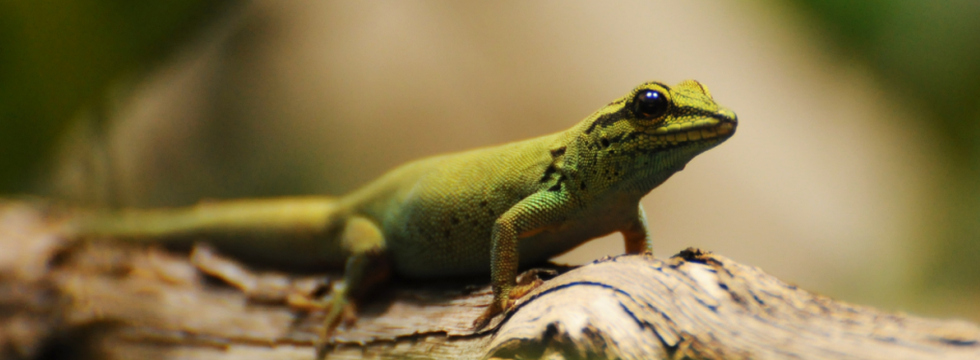 TURQUOISE DWARF GECKO
TURQUOISE DWARF GECKO Lygodactylus williamsi
Lygodactylus williamsi This colourful little reptile is captured in large numbers to meet the demands of the international pet market. This has brought it to the brink of extinction. A further threat is the destruction of its restricted habitat, which only has a size of around 20 km2.
This colourful little reptile is captured in large numbers to meet the demands of the international pet market. This has brought it to the brink of extinction. A further threat is the destruction of its restricted habitat, which only has a size of around 20 km2. In 2009, ZGAP supported a research project which enabled the determination of a conservation status according to the criteria of IUCN Red List. The Turquoise Dwarf Gecko is now classified as "Critically Endangered“.
In 2009, ZGAP supported a research project which enabled the determination of a conservation status according to the criteria of IUCN Red List. The Turquoise Dwarf Gecko is now classified as "Critically Endangered“. -
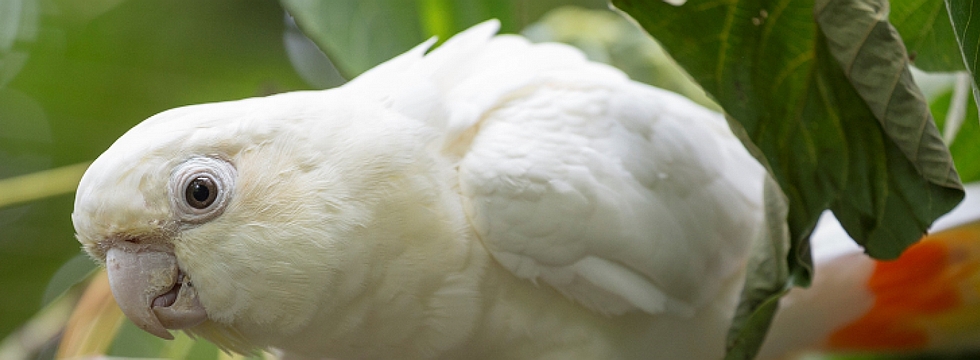 RED-VENTED COCKATOO
RED-VENTED COCKATOO Cacatua haemoturopygia
Cacatua haemoturopygia When the Red-Vented Cockatoo came into focus of conservationists in 1998, only 23 individuals remained. The reasons for this devastating decline were the poaching of nestlings and the destruction of rain forests and mangroves. The latter resulted in a depletion of feeding and nesting trees for the birds.
When the Red-Vented Cockatoo came into focus of conservationists in 1998, only 23 individuals remained. The reasons for this devastating decline were the poaching of nestlings and the destruction of rain forests and mangroves. The latter resulted in a depletion of feeding and nesting trees for the birds. Since 1998, ZGAP and fellow campaigners have initiated and supported the work of the Katala Foundation: intensive breeding programs, guarding of the nests, and educational work among the local communities resulted in a current population of around 350 birds (2017).
Since 1998, ZGAP and fellow campaigners have initiated and supported the work of the Katala Foundation: intensive breeding programs, guarding of the nests, and educational work among the local communities resulted in a current population of around 350 birds (2017). -
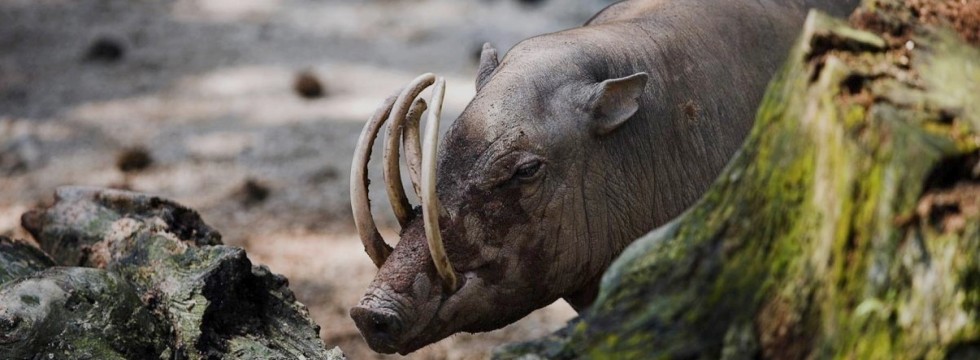 NORTH SULAWESI BABYRUSA
NORTH SULAWESI BABYRUSA Babyrousa celebensis
Babyrousa celebensis The endemic North Sulawesi Babyrusa is currently listed as "endangered" on the IUCN Red List. Illegal gold digging, logging, and slash-and-burn land clearing have led to a continual decline of the population. Meanwhile, the Babyrusa has disappered from large parts of the island.
The endemic North Sulawesi Babyrusa is currently listed as "endangered" on the IUCN Red List. Illegal gold digging, logging, and slash-and-burn land clearing have led to a continual decline of the population. Meanwhile, the Babyrusa has disappered from large parts of the island. In addition, the remaining animals are being poached for their meat. Our partners on the island organize anti-poaching initiatives, work on the protection of the habitat, and conduct educational work for local people, so that meanwhile the prognosis for these impressive animals has improved.
In addition, the remaining animals are being poached for their meat. Our partners on the island organize anti-poaching initiatives, work on the protection of the habitat, and conduct educational work for local people, so that meanwhile the prognosis for these impressive animals has improved.
Help for unknown endangered species
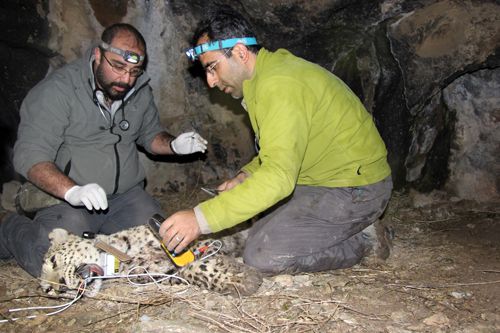
Projects
Would you like to learn more about the species, ZGAP has taken action for since its foundation? We chose a small selection of completed and ongoing projects to give you an impression of our manifold activities.
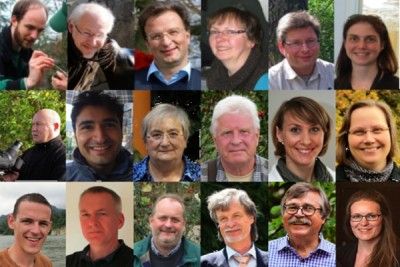
Membership
Would you like to commit yourself to species conservation and support the ideas of ZGAP? We are happy to welcome new members, who are interested to learn more about our work and want to participate financially or bring in their expertise.
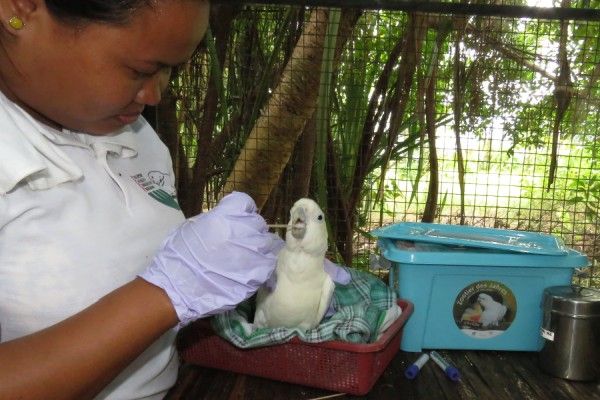
Donate & Help
Here, we inform you about how you can contribute to the conservation of highly endangered species – either through donations, spreading news on social media, publication of free ads, internships, and much more.
Thanks to all our supporters, we have contributed to numerous activities since 1982
Last update: November 2022
-

more than313projects
-

in more than50countries
-
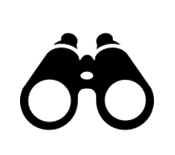
for more than289 species
-

10protected areas
-

and4,4million € funding in total
-

We carefully choose projects with the profound support of our advisory board
-

We are in touch with our project partners to ensure the adequacy of our project expenses
-

We report about the results of the projects in our journal "ZGAP Mitteillungen"
-

Everyone can donate to our projects fast and easily
-

ZGAP is recogniosed as charitable, so your donation is tax deductible
-
 We guarantee that 100% of your donation will be used for conservation work
We guarantee that 100% of your donation will be used for conservation work
Your donation is an investment in the future!
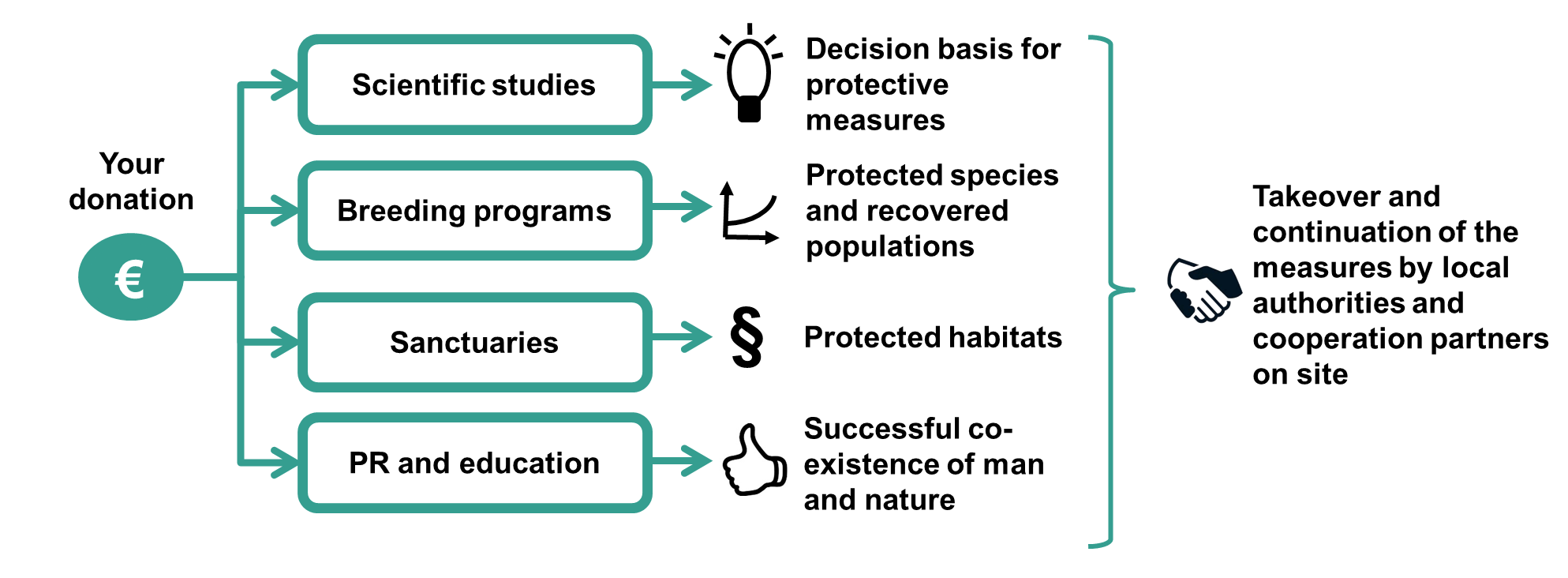
Scientific studies
We support on site projects, which aim at gaining new scientific knowledge and thus provide a profound basis of decision-making for future protective measures.
Breeding programs
We support breeding programs to foster the recovery and stabilsation of endangered species.
Sanctuaries
The projects we support establish sanctuaries for endangered unknown species, which are not in focus of other conservational organisations.
PR and education
Wie support projects that raise awareness among local communities and qualify local professionals.
Current information on ZGAP
The gecko is "Zoo Species of the Year 2024"
Learn more about the campaign’s background and the projects we support!
These projects currently need your particular attention
With your donation, you can help us to support these urgent activities!
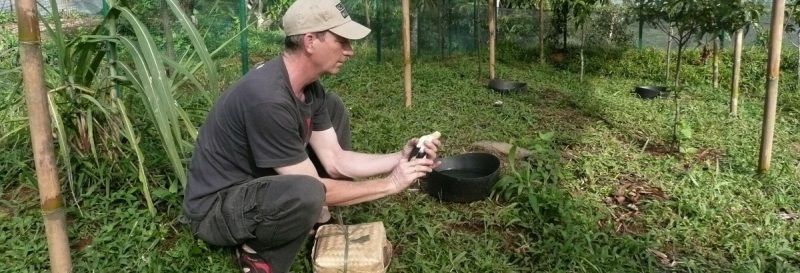
Newsletter
Receive news from our projects and about ZGAP via email (written n German)!




